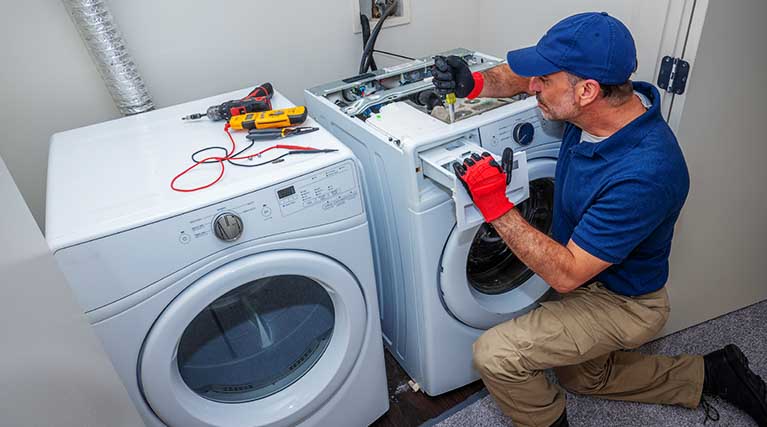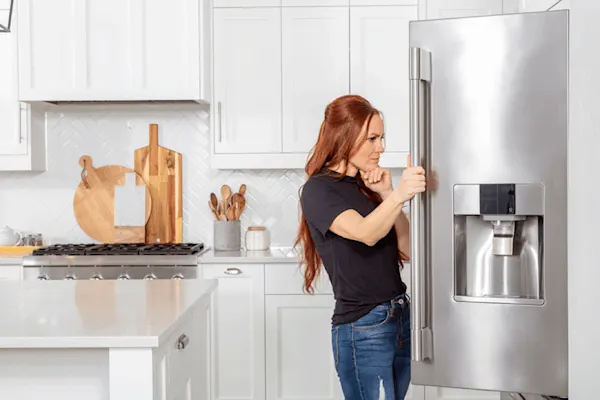The Ultimate Guide to Understanding Home Appliance Repair Work at Home
When your fridge quits cooling or your oven refuses to warm, it can really feel overwhelming. Comprehending appliance repair work in the house can conserve you money and time. You'll discover to recognize signs and symptoms, use crucial tools, and comply with an organized troubleshooting procedure. Before you begin, there are vital safety preventative measures you require to take right into account. What are the most common troubles, and just how can you fix them? Let's discover the basics.
Usual Home Appliance Problems and Their Signs
When your home appliances start breaking down, it's important to acknowledge the indicators beforehand. Neglecting them can result in bigger issues and expensive repair services. For example, if your fridge isn't cooling correctly, you may observe cozy places or condensation forming. This could suggest a falling short compressor or a blocked vent.Your dish washer might reveal issues via dirty meals or unusual noises throughout cycles. If you listen to grinding or clanking, it's time to investigate.A washing device that will not spin or drain can leave you with soggy washing, suggesting a stopped up drain or a malfunctioning pump.Lastly, if your oven's temperature level seems off or it takes for life to pre-heat, you may be taking care of a damaged thermostat. By remaining sharp to these signs and symptoms, you can attend to problems before they intensify right into major repair services.
Essential Tools for Device Fixing
When you're taking on appliance repair services at home, having the right tools is important. Standard hand tools like screwdrivers and pliers will assist you dismantle and deal with various appliances, while electric screening gadgets assure you're working securely with circuitry. Allow's look at what you require to start on your repair journey.
Basic Hand Tools
Having the right devices is vital for effective appliance fixing in your home. Begin with a reputable screwdriver collection, consisting of both flathead and Phillips kinds, as screws prevail in device assembly. Pliers are also essential; they aid with gripping, twisting, and reducing cords or tiny components. A pair of needle-nose pliers can get to difficult situations quickly. You'll require an excellent adjustable wrench for tightening or loosening up nuts and screws. An energy knife is handy for reducing via packaging or insulation. Don't forget a tough workbench or surface area to safely organize your tools and parts. With these standard hand tools, you'll be well-prepared to take on most appliance repairs that come your means.
Electric Screening Instruments
Along with fundamental hand tools, electric screening gadgets play a vital role in home appliance repair service. These tools assist you identify electrical concerns and warranty devices function safely. A multimeter is essential; it determines voltage, existing, and resistance, allowing you to identify troubles swiftly. A non-contact voltage tester is another must-have, allowing you spot real-time cords without making straight get in touch with, enhancing your security. Secure meters are excellent for measuring present circulation in wires without disconnecting them, conserving you time and initiative. Furthermore, circuit testers can swiftly examine if outlets are working correctly. By making use of these devices, you'll simplify your troubleshooting process and enhance your repair work abilities, making home appliance upkeep a lot much easier.
Step-by-Step Overview to Diagnosing Appliance Issues
When your device acts up, it can be aggravating, yet identifying the issue doesn't have to be overwhelming. You'll find out to determine usual troubles and apply effective repairing techniques. Let's go through the steps to get your home appliance back in functioning order.
Common Device Problems

Fixing Strategies Clarified

Repairing Major Kitchen Appliances: A Closer Look
Have you ever before asked yourself exactly how to deal with common issues with your kitchen devices? Fixing major kitchen area appliances like fridges, ovens, and dishwashers can be less complicated than you assume. Begin by identifying the issue-- whether it's a refrigerator not cooling down or a stove that will not heat. Commonly, a straightforward reset or inspecting the power resource can address the issue.For fridges, clean the condenser coils and examine the door seals. If your oven's not home heating, check the burner and thermostat. Dish washers could just require a clean filter or a reset to obtain them back at work. Constantly unplug the home appliance before diving into repair work to ensure your safety.Don' t forget to consult the user handbook for particular repairing tips associated with your design. With a little bit of perseverance and the right devices, you can confidently take on home appliance repairs and conserve cash while doing so!

Fixing Laundry Appliances: Tips and Techniques
When your washing appliances begin breaking down, it can feel frustrating, yet fixing them does not need to be an inconvenience. Begin by inspecting the power supply. Confirm the home appliance is plugged in and the outlet is working. Next, check the door or lid switch; a defective switch can avoid the maker from operating.For washing machines, if it's not rotating, look for unbalanced loads. Rearranging the garments might fix the issue. If your clothes dryer isn't heating, tidy the lint filter and check the vent for blockages.Listen for unusual noises; they can suggest a trouble. If your device is dripping, check the tubes for fractures or loose links. Record any error codes shown on digital displays, as they can assist you in determining the problem. Ultimately, speak with the individual handbook for details troubleshooting pointers associated with your model.
Safety And Security Preventative Measures to Take Throughout Repair works
Prior to you start any home appliance fixings, it's necessary to focus on safety and security to prevent crashes or injuries. Initially, disconnect the home appliance or switch off the circuit breaker to ensure no power reaches it while you work. Use shielded devices to minimize the danger of electric shock. Wear security goggles and handwear covers to safeguard on your own from sharp edges or debris (Washer dryer repair service Dependable Refrigeration).Make certain your work space is clean and well-lit, so you can see what you're doing. Maintain youngsters and animals away from the area to avoid interruptions and possible dangers. If you're taking care of gas appliances, be added cautious; check for leakages prior to proceeding.Take your time, and don't rush through repair work. If you really feel unpredictable about any action, it's better to pause and study than to think. Adhering to these safety measures will aid develop a more secure environment for your do it yourself home appliance repair service project
When to Call a Specialist for Help
Exactly how do you know if it's time to employ an expert for home appliance repair services? If you have actually tried fundamental troubleshooting without success, it's a clear indication. For example, if your device still won't start or shows uncommon noises after resetting it, don't be reluctant to look for specialist help.When you notice leaks, smoke, or melting smells, focus on security and call a pro quickly. These issues can lead to even more significant damages or posture dangers to your home.Also, if your home appliance is under guarantee, speaking to a professional is usually the most effective path. They can guarantee that repairs will not invalidate your guarantee, conserving you cash in the lengthy run.Finally, if you're not sure or uncomfortable with complex repairs, it's smart to leave it to the specialists. Bear in mind, dealing with difficult issues without the ideal experience can lead to costly blunders. Count on a specialist when unsure!
Frequently Asked Questions
How Can I Avoid Appliance Troubles in the Future?
To protect against home appliance issues in the future, you should carry out regular maintenance, look for wear and tear, tidy filters, and stay clear of overloading. Staying aggressive will certainly help expand their life expectancy and maintain them running efficiently.
What Are one of the most Usual DIY Home Appliance Fixing Mistakes?
You might neglect safety preventative measures, avoid troubleshooting steps, or make use of inaccurate devices when attempting do it yourself appliance fixings. Rushing the process or disregarding producer guidelines can lead to more substantial problems and expensive errors. Keep person and notified!
How Do I Know if a Component Needs Replacement?
You can tell if a part requires substitute by examining for unusual noises, leakages, or irregular efficiency. If the appliance battles to operate correctly or reveals noticeable damage, it's most likely time for a replacement.
Can I Make Use Of Generic Components for Home Appliance Repairs?
Yes, you can make use of common parts for device repair work, but establish they're suitable - Dependable Refrigeration & Appliance Repair Service Dryer repair near me. Generic parts might conserve you cash, yet they can influence performance or durability, so consider your alternatives carefully before deciding
What Warranties Cover Home Appliance Repairs?
The majority of home appliance guarantees cover repair work for producing issues, yet they often omit damage from misuse. Inspect your guarantee terms carefully, as some might require using certified technicians and original parts for coverage to stay valid.